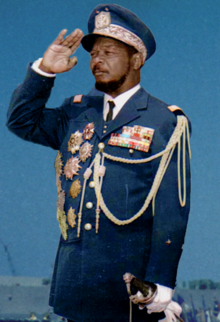Bokassa I
| Jean-Bédel Bokassa/Bokassa I | |
|---|---|

Jean-Bédel Bokassa during his July 1970 state visit to Romania
|
|
| Emperor of Central Africa | |
| Reign | 4 December 1976 – 20 September 1979 |
| Predecessor | Himself (As President) |
| Successor | Empire Abolished |
| 2nd President of the Central African Republic | |
| Term | 1 January 1966 – 4 December 1976 |
| Predecessor | David Dacko |
| Successor | David Dacko |
| Born |
22 February 1921 Bobangui, Ubangi-Shari, French Equatorial Africa (now Central African Republic) |
| Died | 3 November 1996 (aged 75) Bangui, Central African Republic |
| Spouse | Catherine Denguiadé |
| Issue |
Prince Jean-Serge Crown Prince Jean-Bédel |
| House | House of Bokassa |
| Father | Mindogon Bokassa |
| Mother | Marie Yokowo |
| Religion | Catholicism, Islam briefly between September 1976 and December 1976 |
Jean-Bédel Bokassa (French pronunciation: [ʒɑ̃ bedɛl bɔkasa]; 22 February 1921 – 3 November 1996), also known as Bokassa I of Central Africa and Salah Eddine Ahmed Bokassa, was a dictator of the Central African Republic and its successor state, the Central African Empire, from his coup d'état on 1 January 1966 until overthrown in a subsequent coup (supported by France) on 20 September 1979. Of this period, he served almost eleven years (1 January 1966 – 4 December 1976) as president (the last four years as president for life), and for almost three years he reigned as self-proclaimed Emperor of Central Africa, though he was a military dictator. His "imperial" regime lasted from 4 December 1976 to 20 September 1979. Following his overthrow, the Central African Republic was restored under his predecessor, David Dacko. Bokassa's imperial title did not achieve international diplomatic recognition.
Born in Ubangi-Shari in French Equatorial Africa, the son of a village chief, Bokassa was orphaned at age 12. Educated in mission schools, he joined the French colonial army in 1939 as a private. He distinguished himself in the war in Indochina, winning medals and rising to the rank of captain. When Ubangi-Shari gained its independence as the Central African Republic in 1960, the new president David Dacko, who was his distant cousin, invited Bokassa to head the armed forces. In 1966, Bokassa used his position to oust Dacko and declared himself president. He then began a reign of terror, taking all important government posts for himself. He personally supervised judicial beatings and introduced a rule that thieves would have an ear cut off for the first two offenses and a hand for the third. In December 1976, in emulation of his hero Napoleon, he appointed himself emperor of the Central African Empire, with a coronation ceremony in 1977 costing US$20 million ($80 million today), practically bankrupting the country. His diamond-encrusted crown alone cost $5 million ($20 million today). In 1979 he had hundreds of schoolchildren arrested for refusing to buy uniforms from a company owned by one of his wives. Bokassa was reported to have personally supervised the massacre of 100 of the schoolchildren by his Imperial Guard.
...
Wikipedia
